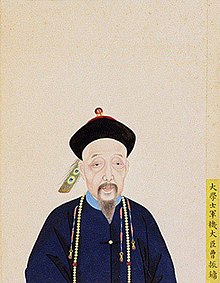Cao Zhenyong
Cao Zhenyong | |
|---|---|
 | |
| Chief Grand Councillor | |
| In office 1824–1835 | |
| Preceded by | Changling |
| Succeeded by | Wenfu |
| In office 1820–1823 | |
| Preceded by | Tojin |
| Succeeded by | Changling |
| Grand Secretary of the Wuying Hall | |
| In office 1821–1835 | |
| Grand Secretary of the Tiren Library | |
| In office 1813–1821 | |
| Assistant Grand Secretary | |
| In office 1813–1813 | |
| Minister of Personnel | |
| In office 10 October 1813 – 14 October 1813 Serving with Songyun | |
| Preceded by | Zou Bingtai |
| Succeeded by | Zhang Xu |
| Minister of Revenue | |
| In office 19 August 1809 – 10 October 1813 Serving with Lukang (until 1810), Tojin (since 1810) | |
| Preceded by | Dai Quheng |
| Succeeded by | Pan Shi'en |
| Minister of Works | |
| In office 20 November 1806 – 19 August 1809 Serving with Yunbu | |
| Preceded by | Wang Zhiyi |
| Succeeded by | Dai Quheng |
| Personal details | |
| Born | 1755 She County, Anhui, China |
| Died | 1835 (aged 79–80) Beijing, China |
| Parent |
|
Cao Zhenyong (simplified Chinese: 曹振镛; traditional Chinese: 曹振鏞; pinyin: Cáo Zhènyōng; 1755–1835) was a Chinese statesman of the Qing dynasty. He served in a leading position in the Grand Council under the Daoguang Emperor. He is widely believed to be responsible for the formalized style of government, which was promoted under the Daoguang Emperor's reign and contributed to the emperor's failure to reform the increasingly corrupt administration of the Qing Empire.
